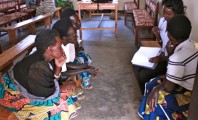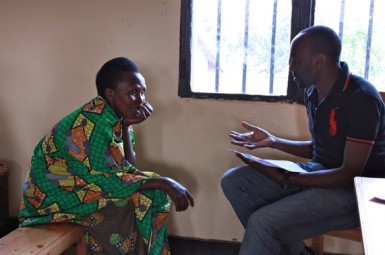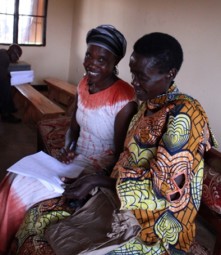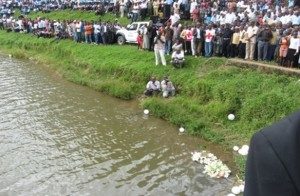
A guest post by Kelsey Finnegan, SURF Rwanda Project Officer:
Last month marked the roll out of our first evaluation research experiment. Throughout our work facilitating income generation training groups and counseling for survivors, we have realized the incredible impact forming women into groups can have.
While income generating activity (IGA) training and counseling groups are different and intended for different things, we have found that there are similarities and unintended benefits within both methods of support. For example, when speaking with the members of the counseling groups, it became apparent that while trauma was being reduced (as intended), the women were also more hopeful and confident. The fact that symptoms of trauma are reduced and confidence is enhanced means that the women are more likely to move forward and engage in income generating businesses that can sustain their lives. Separately, the IGA training, which includes no formal counseling support, also facilitates the creation of social networks and support systems. Once isolated and housebound, the women in the IGA groups are now kept busy running their new businesses, allowing them to focus more on their future and less on the issues of the past. As a result, trauma is reduced and quality of life is improved from the support of the group.
While we have observed this across all of our livelihood development and counselling projects, we haven’t been able to specifically track and compare the means of change. In order to do so, we decided to craft a research experiment to measure exactly what it is that creates change and prompts hope for our beneficiaries – is it the groups that are the most powerful, or is it the actual IGA and counseling training? In partnership with AVEGA Agahozo, the experiment will survey over 300 individuals benefiting from counseling and IGA groups in the DFID funded Widowed Survivors Empowerment Project (WSEP). The survey measures symptoms of post-traumatic stress disorder (PTSD), perceived quality of life, livelihoods, and well-being.
AVEGA staff identified new IGA and counselling groups being formed in the Southern region of Rwanda, and we set out to survey them before and after being a part of the groups. In August, over 120 individuals in the IGA groups completed the survey, despite incredible difficulties in gathering the information.

Based in an isolated village two hours outside the Huye province of Rwanda, the majority of the women in the groups are unable to read and write. While we expected this to be a problem, we had no idea that the illiteracy among them would be so high, and how difficult it would be to have them fill in the 5 page survey.
In the IGA groups for example, of 80 women that initially showed up on the first day, only 5 could read and write. To address this, the SURF and AVEGA staff broke them into small groups and filled the surveys out for them, one by one.

The women showed incredible patience and enthusiasm for being a part of the project. While it was not required or even asked, all of those that could read and write stayed after finishing their own surveys to help others.
Despite being the first to finish filling out her survey, this woman (right) stayed until 6pm with us, going from person to person and walking them through the survey until the last person was finished.
Something we did not anticipate was that the survey would validate a lot of the women’s feelings and problems. Many exclaimed that they were happy to have a space to share and track their own growth. “Next time we see you, we will be better and even entrepreneurs” they promised.
For the counseling groups, 161 women started the survey last week. As with the IGA groups, those that could read and write stayed behind to help the AVEGA and SURF staff.
Early analysis of the surveys shows a large majority suffering from symptoms of PTSD, a perpetual issue that many survivors are still struggling with today. We are hoping to see these numbers reduce in the groups in the following months.
For the sake of comparison, we will also be monitoring women that are not benefiting from a group intervention. Research and analyzing of the data will continue for over 6 months, culminating with a written research report documenting the findings.
By analyzing the cause of change, SURF and AVEGA will know which aspects of group interventions are most helpful for our beneficiaries. In addition to this, the research will identify a model for best practice that addresses the most effective ways to prompt income and reduce trauma among genocide survivors.


